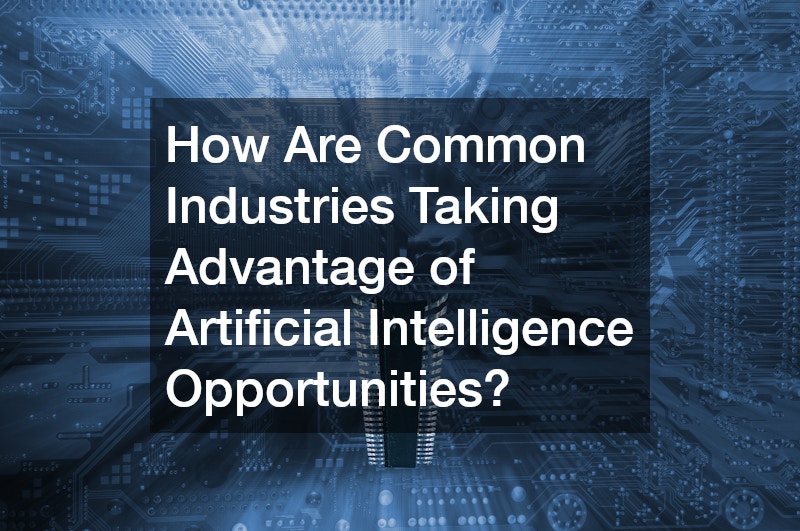How Are Common Industries Taking Advantage of Artificial Intelligence Opportunities?

Artificial Intelligence (AI) has become one of the most transformative technologies of our time, fostering innovation and operational efficiency across various sectors. From healthcare providers implementing fda cleared pdo threads to streamline patient treatments to auto detailers enhancing their visibility through auto detailer seo services, the opportunities for AI are immense. In this article, we will explore how industries ranging from finance to agriculture are leveraging AI to create smarter processes, improve customer experiences, and drive profitability.
The integration of AI is not limited to large organizations; small businesses, such as dentists employing intelligent scheduling systems or local civil engineers using predictive analytics for infrastructure projects, are also experiencing the benefits. With the increasing availability of data, industries ranging from emergency clinics to education can harness AI tools to create more data-driven approaches in decision-making. Ultimately, understanding AI’s far-reaching implications can help organizations position themselves favorably in a rapidly evolving market.
As we delve deeper into the applications of AI across various sectors, we will discuss its impact on healthcare, finance, retail, and beyond. This exploration will highlight the specific roles AI plays and the advantages it brings to different industries, including how credit union data processing service providers are revolutionizing financial transactions. Whether you’re a business owner, corporate decision-maker, or simply curious about technological advancements, this article aims to inform you about the numerous possibilities AI holds for common industries.
1. How is the Healthcare Industry Utilizing AI?
The healthcare sector has been a significant beneficiary of AI technologies, particularly in areas such as diagnostics, patient care, and administrative tasks. For instance, emergency clinics are now employing AI algorithms to quickly analyze patient data and provide faster triage, thus improving patient outcomes. Moreover, advanced imaging technologies powered by AI have enhanced the accuracy of diagnostics, allowing doctors to detect diseases earlier.
One notable advancement is the use of fda cleared pdo threads in cosmetic procedures, where AI can help predict results and personalize treatments based on individual patient characteristics. AI enables healthcare providers to analyze vast datasets from previous patients to optimize treatment plans and increase patient satisfaction. Furthermore, AI-driven virtual health assistants help manage appointments and medications, relieving some administrative burdens from healthcare professionals.
Additionally, predictive analytics applications powered by AI assist in understanding patient behaviors, ultimately leading to improved healthcare services. By analyzing factors such as previous visits and insurance claims, AI helps healthcare facilities tailor interventions and resources where they are most needed. This comprehensive application of AI not only enhances patient care but also reduces operational costs significantly.

2. What Are the Benefits of AI in the Finance Sector?
The finance sector has rapidly adopted AI algorithms to streamline operations and improve decision-making processes. One way this is achieved is through the automation of routine tasks, thereby freeing up valuable time for accountants and financial analysts. AI-driven systems can process large volumes of transactions, monitor for fraud, and provide insights based on real-time market data, which enhances the overall consumer experience.
Additionally, AI technologies enable credit unions to leverage a credit union data processing service that can analyze customer data for better lending decisions and risk assessments. By integrating machine learning models, credit unions can personalize loan offerings and reduce default risks by more accurately identifying creditworthy applicants. This enhanced understanding not only fosters customer trust but also improves the overall stability of financial institutions.
Moreover, AI aids in investment management, where robo-advisors provide clients with tailored investment strategies based on their financial goals and risk tolerance. This accessibility to advanced financial tools democratizes wealth management, allowing individuals to engage with investment opportunities at lower costs. Ultimately, AI’s role in finance transforms traditional systems into dynamic, streamlined operations that enhance efficiency and profitability.
3. How is AI Revolutionizing the Retail Industry?
The retail industry is witnessing an unprecedented transformation as AI technologies are integrated into various aspects of operations. From inventory management to personalized marketing strategies, AI provides retailers with powerful tools to enhance customer experiences. This helps in predictive analytics, which empowers businesses to forecast demand, manage stock levels effectively, and reduce waste.
For example, AI-driven chatbots can enhance customer service by providing instant responses to inquiries, thereby improving engagement and satisfaction. In addition, marketers are increasingly utilizing AI to analyze consumer shopping behaviors, allowing retailers to tailor promotions and offers that resonate with specific demographics. The five-star ratings enjoyed by businesses leveraging auto detailer seo services for digital marketing highlight the impact of targeted customer interactions.
Moreover, AI is reshaping the in-store experience, enabling retailers to provide personalized recommendations through data analysis of purchase history and preferences. Smart mirrors in clothing stores utilize AI to help customers visualize outfits, while mobile applications offer personalized deals to drive sales. As retailers continue to navigate evolving consumer behaviors, AI remains a critical component in their strategy to enhance brand loyalty and boost competitive advantages.
4. What Role Does AI Play in Manufacturing?
AI’s transformative power in the manufacturing sector is evident through the optimization of production processes and supply chain management. Companies now employ AI to monitor machinery health, predict maintenance needs, and reduce downtime, ensuring smoother operations. Automation through robotics, aided by AI, has resulted in increased precision and efficiency on production lines.
Additionally, AI enhances resource management, allowing manufacturers to minimize waste and maximize output. Predictive analytics can identify inefficiencies and propose solutions, leading to substantial cost savings. Furthermore, AI algorithms can analyze market trends and consumer demands, enabling factories to adjust their output accordingly and stay ahead of competition.
Moreover, AI-driven machines can collaborate with human workers, improving workplace safety and mitigating risks associated with hazardous tasks. The integration of these systems promotes a culture of innovation while adhering to regulatory compliance standards. As manufacturing embraces AI, the industry evolves into a more agile and responsive environment, harnessing technology to meet the changing landscape of global manufacturing.

5. How is the Transportation Industry Leveraging AI?
The transportation industry is rapidly evolving with AI technologies improving efficiency and safety on the roads. Autonomous vehicles are perhaps the most prominent application, where AI systems process data from various sensors to navigate and make real-time decisions. This technology has the potential to reduce accidents caused by human error, thus making transportation safer.
In addition to self-driving systems, AI aids logistics companies in optimizing delivery routes and improving fleet management. By analyzing traffic patterns and delivery schedules, AI can reduce fuel consumption and enhance service speed. These efficiencies not only lower operational costs but also contribute to a more sustainable transportation ecosystem.
AI systems used in public transportation facilitate better scheduling and maintenance predictions, reducing wait times and improving service quality. Commuters benefit from AI-driven apps that provide real-time updates on bus and train schedules. With these advancements, the transportation sector continues to enhance the user experience while streamlining operations, paving the way for a more integrated and efficient transportation system.
6. How is AI Impacting the Education Sector?
The education sector is embracing AI technologies to enhance learning experiences and administrative efficiency. AI-driven platforms enable personalized learning, adapting course content to fit the specific needs of individual students. By analyzing performance data, these systems provide tailored learning pathways, increasing student engagement and improving outcomes.
Moreover, AI tools assist educators in automating administrative tasks such as grading and attendance tracking. This automation allows teachers to allocate more time to direct instruction and student interaction. AI-driven analytics can also identify students who may be struggling, enabling timely interventions to support academic success.
Virtual tutors powered by AI are transforming the way students learn, providing on-demand assistance when they need help. These intelligent systems can offer explanations and additional practice problems in real-time, enhancing mastery of subjects. As schools and universities continue to explore AI’s possibilities, the education sector is poised for a significant transformation that emphasizes personalized and effective learning experiences.

7. In What Ways is AI Being Used in Agriculture?
In agriculture, AI is revolutionizing farming practices by providing insights that improve yields and reduce resource consumption. Precision farming techniques leverage AI data analysis to monitor crop health and automate irrigation systems. This targeted approach not only maximizes productivity but also conserves water and other inputs, leading to more sustainable agricultural practices.
Moreover, AI technologies such as drones and sensors collect real-time data, allowing farmers to make informed decisions based on soil health, weather patterns, and crop conditions. These insights help in optimizing planting schedules and managing pests proactively. As a result, the agriculture sector is experiencing an increase in efficiency, product quality, and resilience against climate variability.
Additionally, AI aids in supply chain management within the agricultural sector, improving logistics and distribution. Farmers now utilize AI systems to forecast demand, ensuring that their products reach consumers timely. This kind of intelligent planning minimizes waste and supports a more streamlined approach to meeting consumer needs in the ever-evolving food market.
8. How is AI Enhancing the Entertainment Industry?
The entertainment industry is undergoing a metamorphosis as AI technologies reshape how content is created, distributed, and consumed. Streaming services leverage AI algorithms to provide personalized content recommendations based on viewers’ watching habits. This level of customization enhances user engagement, leading to higher retention rates and viewer satisfaction.
Beyond content recommendations, AI streamlines the production process in the film and music industries. From script analysis to post-production effects, AI tools assist in evaluating potential box office success and optimizing production costs. This data-driven approach allows creators and producers to make informed decisions, thus mitigating risks associated with large investments.
Additionally, advancements in AI-generated content are opening new frontiers in creativity. AI systems can now compose music, create animations, and even write scripts, augmenting the artistic process. This collaboration between AI and human creativity could lead to innovative storytelling methods, forever changing the entertainment landscape.
9. What Are the Applications of AI in Real Estate?
AI is making significant strides in the real estate sector, providing tools that enhance property management, sales, and investment strategies. AI algorithms can analyze vast datasets on market conditions, pricing trends, and consumer behavior, enabling real estate agents to set competitive prices and identify profitable investments. This data-driven approach ensures that various stakeholders make informed decisions based on accurate analytics.
Furthermore, AI-powered CRM systems streamline communication between agents and clients, allowing real estate professionals to provide tailored services that address specific client needs. These systems can automate appointment scheduling, lead tracking, and property recommendations, living up to the demand for prompt and personalized service. This technological integration not only boosts productivity but also enhances customer satisfaction.
In property management, AI applications help optimize maintenance schedules and reduce operational costs. Predictive analytics can anticipate potential issues, such as HVAC failures, prompting timely interventions. Through improved efficiency and effective management, property owners can enhance tenant experiences and increase retention rates.

10. How is AI Benefiting the Energy Sector?
AI technologies are playing a crucial role in advancing the energy sector’s efficiency and sustainability initiatives. Smart grids powered by AI can analyze energy consumption patterns and adjust supply accordingly, leading to optimized energy use and reduced costs. This technology offers immediate benefits to utilities and consumers alike, promoting a more efficient consumption model.
Moreover, AI facilitates predictive maintenance for energy infrastructure by continuously monitoring equipment health and performance. By predicting failures before they occur, companies can conduct timely maintenance, thereby minimizing downtime and service disruptions. These efficiencies translate into cost savings and improved energy reliability for consumers.
AI also aids in integrating renewable energy sources into power grids. Through advanced forecasting of solar and wind energy production, AI systems can contribute to more stable energy supply management. This supports global efforts to transition to cleaner energy alternatives while ensuring grid reliability.
Conclusion
In summary, the opportunities presented by artificial intelligence span various industries, from healthcare to agriculture and beyond. Each sector is discovering unique ways to utilize AI to enhance operations, foster innovation, and improve customer experiences. As we’ve seen, applications such as fda cleared pdo threads in healthcare and credit union data processing services in finance exemplify how AI is driving advancements across sectors.
From home and auto insurance agents to surveillance services and DUI attorneys, the ongoing integration of AI technologies outlines a path toward a more efficient, data-driven future. As organizations continue to embrace these transformative solutions, the question is not whether to adopt AI but rather how to effectively harness its capabilities. By understanding and leveraging AI’s potential, businesses can position themselves advantageously in an increasingly competitive landscape.



